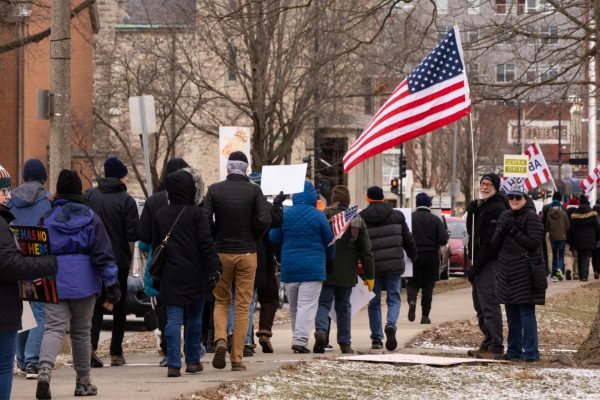Study questions private schools
Apr 28, 2005
Last updated on May 11, 2016 at 08:55 p.m.
There are numerous reasons to enroll students into private schooling. But based on a new study co-authored and presented by two University education professors mid-April, higher academic achievement may not be one.
According to the Council for American Private Education, more than 6.25 million students were enrolled in private schools in the 2003-2004 school year – more than one for every 10 students in the United States. One of the widely held perceptions about private schools is that they do a better job of educating the students.
But the study conducted by Christopher and Sarah Lubienski and presented at the annual meeting of the American Educational Research Association in Montreal found that, when socioeconomic factors are considered, students in public schools between fourth and eighth grades do better than their counterparts in private schools.
Sarah Lubienski said a study on private versus public education was not her initial intention.
Get The Daily Illini in your inbox!
“I was doing a study on the relationship of different mathematics instructional practices and student achievement and equity,” Lubienski said. “And in doing that, I thought I needed to control for public and private schools.”
She said the study used the most recent national data set, the 2000 National Assessment of Educational Progress, to evaluate what schools had similar socioeconomic statures.
While annual household income was not an available variable, she said factors such as the amount of education students’ parents received, the amounts of books in students’ homes and the amount of available computer and Internet access were all carefully scrutinized.
When accounting for this variable, Lubienski said she expected to see that students receiving private education would score higher. Jim Nowlan, senior fellow at the University’s Institute of Government and Public Affairs, said the difference in enrollment practices might account for the belief that students who receive private education would perform better.
“The thought by many is that public schools have to enroll everyone, whereas private ones often get to choose,” Nowlan said. “Parents who pay for tuition … expect more from the school.”
Tammy Collins, facilities and project coordinator for the college of education, said she thinks the belief may also come from the difference in classroom environments between public and private schools.
“I think (private schools) have more control over the students,” Collins said. “They can have stricter policies, more control over the student population, and they don’t (necessarily) have large classrooms.”
Nowlan said that, because they are not bound by state laws and regulations, private schools have a better ability to keep order in the classroom. For example, he said private schools can expel students easily while it is tougher to do so for public schools.
But the study done by the Lubienskis puts the commonly held belief that private schools provide a better education by default into question. When Sarah Lubienski was going over her data, she said she found just the opposite when she also took into account students’ economic backgrounds.
“If you just look at the private (school) achievement mean, it’s much higher than the public (school) achievement mean,” she said. “When you’re faced with a really low socioeconomic school and a really high socioeconomic private school … your kids probably will do better when they’re studying with other high socioeconomic status kids.
“But when you statistically control for the differences in who goes to these schools … if you take a public school and a private school with similar socioeconomic status of the students, you’ll see that the public schools do equal or better than the private,” she said.
Lubienski said that, since the study was done only on 4th through 8th grade students, it is not known whether the results of the study translate to higher levels of academic achievement. She said most of the research that had suggested private schools were better was done at the high school level, but added that those studies were done roughly 30 years ago, and the data is no longer necessarily reliable.
The results of the research may surprise some, but not Beth Shepperd, assistant superintendent of human resources and community relations for Champaign School District 4.
“I believe that public schools generally have better qualified teachers, which is critical to strong instruction,” she said. Shepperd said she believes public schools are held to a higher standard concerning the rigor of the curriculum.
“Certification and ongoing professional development are required for public school teachers,” Shepperd said.
Unlike public schools, private school job requirements are not necessarily regulated by state standards.
The recent debate over school vouchers – allotments of state funding to a family to pay for private school tuition – may end up giving parents the option of sending their children to private schools. While Nowlan said there has been no serious discussion in Illinois to start a voucher program, there have been limited implementations of the program in cities like Milwaukee. But the results of the study might give parents who may be considering sending their children to private schools a second thought.
Furthermore, Nowlan said the thought is that the vouchers might create serious competition for public schools that will encourage them to improve.
Shepperd said parents who wish to take advantage of vouchers should first consider if their children will actually get a better education.
“I have not seen a satisfactory resolution to the fact that private schools are not required to educate all students,” said Shepperd, who is admittedly a strong proponent of public schooling. “By virtue of the fact that they sort and select for entry, their mission is different than a public school.”





